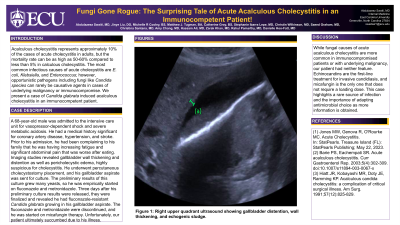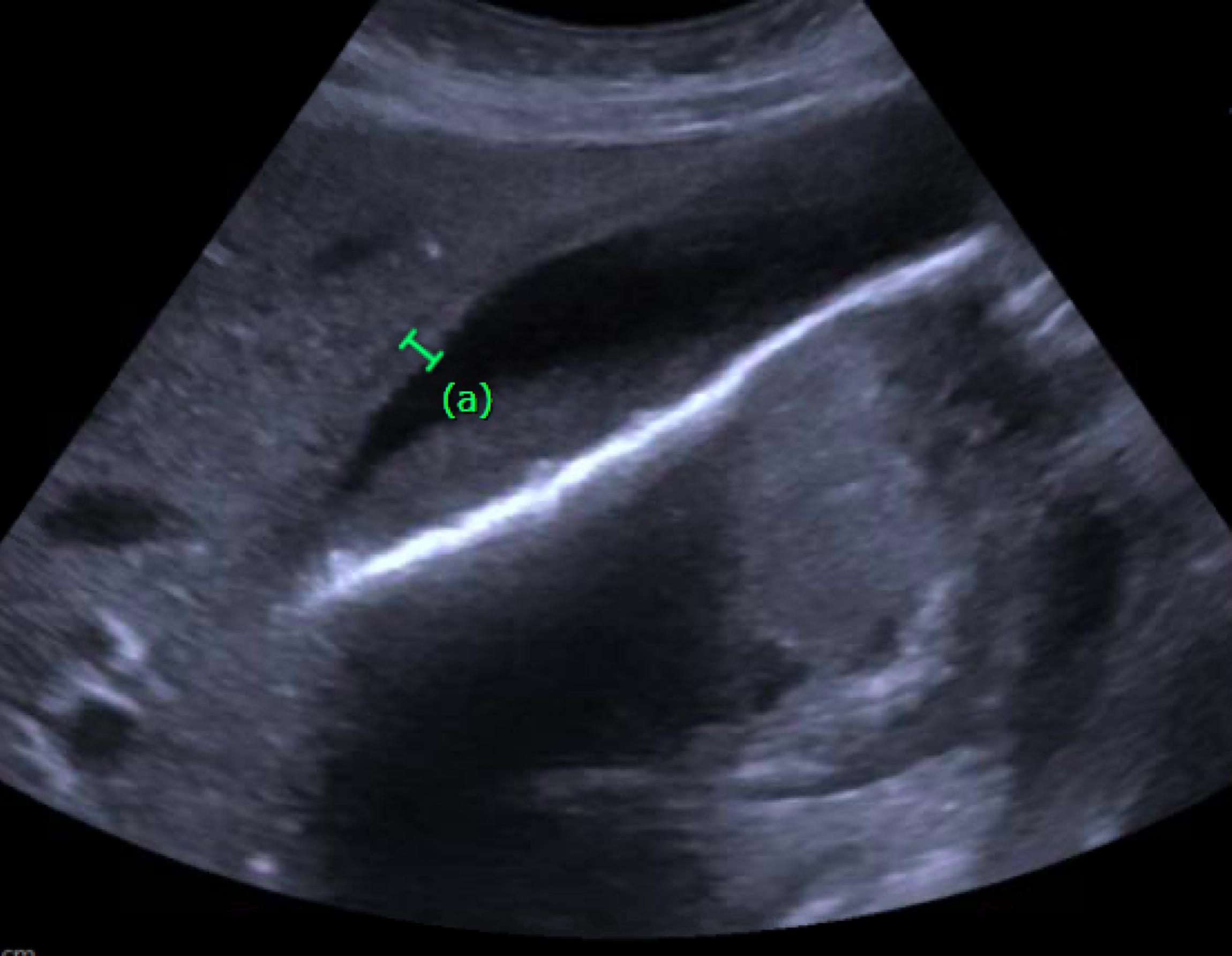Monday Poster Session
Category: Biliary/Pancreas
P1828 - Fungi Gone Rogue: The Surprising Tale of Acute Acalculous Cholecystitis in an Immunocompetent Patient!
Monday, October 28, 2024
10:30 AM - 4:00 PM ET
Location: Exhibit Hall E

Has Audio
- AS
Abdulazeez Swaiti, MD
East Carolina University
Greenville, NC
Presenting Author(s)
Abdulazeez Swaiti, MD1, Jinye Liu, DO2, Michelle Cooley, BS3, Matthew Tugman, BA3, Catherine Gray, BS3, Stephanie Ibarra Lepe, MD2, Christin Wilkinson, MD1, Saeed Graham, MD1, Christina Santana, MD2, Amy Chang, MD2, Hassam Ali, MD1, Zarak Khan, MD4, Rahul Pamarthy, MD1, Danielle Hoo-Fatt, MD4
1East Carolina University, Greenville, NC; 2East Carolina University Medical Center, Greenville, NC; 3East Carolina University Brody School of Medicine, Greenville, NC; 4East Carolina Gastroenterology, Greenville, NC
Introduction: Acute acalculous cholecystitis is a condition that causes inflammation of the gallbladder without the presence of gallstones. Acalculous cholecystitis represents approximately 10% of the cases of acute cholecystitis in adults, but the mortality rate can be as high as 50-60% compared to less than 5% in calculous cholecystitis. The most common infectious causes of acute cholecystitis are Escherichia coli, Klebsiella, and Enterococcus; however, opportunistic pathogens including fungi like Candida can rarely be causative agents in cases of underlying malignancy or immunocompromise. There are few cases in literature of candidal acalculous cholecystitis, with one case report describing its development following the clearing of bacteremia and fungemia.
Case Description/Methods: A 68-year-old male was admitted to the intensive care unit for vasopressor-dependent shock and severe metabolic acidosis. He had a past medical history significant for coronary artery disease, hypertension, and stroke. Prior to his admission, he had been complaining to his family that he was having increasing fatigue and significant abdominal pain that was worse after eating. Imaging studies revealed gallbladder wall thickening and distention as well as pericholecystic edema, highly suspicious for cholecystitis. He underwent percutaneous cholecystostomy placement, and his gallbladder aspirate was sent for culture. The preliminary results of this culture grew many yeasts, so he was empirically started on fluconazole and metronidazole. Three days after his preliminary culture results were released, they were finalized and revealed he had fluconazole-resistant Candida glabrata growing in his gallbladder aspirate. The fluconazole and metronidazole were discontinued, and he was started on micafungin therapy.
Discussion: We present the case of a 68-year-old male with Candida glabrata infection of the gallbladder.
While fungal causes of acute acalculous cholecystitis are more common in immunocompromised patients or with underlying malignancy, our patient had neither feature. Echinocandins are the first-line treatment for invasive candidiasis, and micafungin is the only one that does not require a loading dose. Fluconazole can be used in some situations including patients who do not have a fluconazole-resistant species. This case highlights a rare source of infection and the importance of adapting antimicrobial choice as more information is obtained.

Disclosures:
Abdulazeez Swaiti, MD1, Jinye Liu, DO2, Michelle Cooley, BS3, Matthew Tugman, BA3, Catherine Gray, BS3, Stephanie Ibarra Lepe, MD2, Christin Wilkinson, MD1, Saeed Graham, MD1, Christina Santana, MD2, Amy Chang, MD2, Hassam Ali, MD1, Zarak Khan, MD4, Rahul Pamarthy, MD1, Danielle Hoo-Fatt, MD4. P1828 - Fungi Gone Rogue: The Surprising Tale of Acute Acalculous Cholecystitis in an Immunocompetent Patient!, ACG 2024 Annual Scientific Meeting Abstracts. Philadelphia, PA: American College of Gastroenterology.
1East Carolina University, Greenville, NC; 2East Carolina University Medical Center, Greenville, NC; 3East Carolina University Brody School of Medicine, Greenville, NC; 4East Carolina Gastroenterology, Greenville, NC
Introduction: Acute acalculous cholecystitis is a condition that causes inflammation of the gallbladder without the presence of gallstones. Acalculous cholecystitis represents approximately 10% of the cases of acute cholecystitis in adults, but the mortality rate can be as high as 50-60% compared to less than 5% in calculous cholecystitis. The most common infectious causes of acute cholecystitis are Escherichia coli, Klebsiella, and Enterococcus; however, opportunistic pathogens including fungi like Candida can rarely be causative agents in cases of underlying malignancy or immunocompromise. There are few cases in literature of candidal acalculous cholecystitis, with one case report describing its development following the clearing of bacteremia and fungemia.
Case Description/Methods: A 68-year-old male was admitted to the intensive care unit for vasopressor-dependent shock and severe metabolic acidosis. He had a past medical history significant for coronary artery disease, hypertension, and stroke. Prior to his admission, he had been complaining to his family that he was having increasing fatigue and significant abdominal pain that was worse after eating. Imaging studies revealed gallbladder wall thickening and distention as well as pericholecystic edema, highly suspicious for cholecystitis. He underwent percutaneous cholecystostomy placement, and his gallbladder aspirate was sent for culture. The preliminary results of this culture grew many yeasts, so he was empirically started on fluconazole and metronidazole. Three days after his preliminary culture results were released, they were finalized and revealed he had fluconazole-resistant Candida glabrata growing in his gallbladder aspirate. The fluconazole and metronidazole were discontinued, and he was started on micafungin therapy.
Discussion: We present the case of a 68-year-old male with Candida glabrata infection of the gallbladder.
While fungal causes of acute acalculous cholecystitis are more common in immunocompromised patients or with underlying malignancy, our patient had neither feature. Echinocandins are the first-line treatment for invasive candidiasis, and micafungin is the only one that does not require a loading dose. Fluconazole can be used in some situations including patients who do not have a fluconazole-resistant species. This case highlights a rare source of infection and the importance of adapting antimicrobial choice as more information is obtained.

Figure: Figure 1: Right upper quadrant ultrasound showing gallbladder distention, wall thickening, and echogenic sludge.
Disclosures:
Abdulazeez Swaiti indicated no relevant financial relationships.
Jinye Liu indicated no relevant financial relationships.
Michelle Cooley indicated no relevant financial relationships.
Matthew Tugman indicated no relevant financial relationships.
Catherine Gray indicated no relevant financial relationships.
Stephanie Ibarra Lepe indicated no relevant financial relationships.
Christin Wilkinson indicated no relevant financial relationships.
Saeed Graham indicated no relevant financial relationships.
Christina Santana indicated no relevant financial relationships.
Amy Chang indicated no relevant financial relationships.
Hassam Ali indicated no relevant financial relationships.
Zarak Khan indicated no relevant financial relationships.
Rahul Pamarthy indicated no relevant financial relationships.
Danielle Hoo-Fatt indicated no relevant financial relationships.
Abdulazeez Swaiti, MD1, Jinye Liu, DO2, Michelle Cooley, BS3, Matthew Tugman, BA3, Catherine Gray, BS3, Stephanie Ibarra Lepe, MD2, Christin Wilkinson, MD1, Saeed Graham, MD1, Christina Santana, MD2, Amy Chang, MD2, Hassam Ali, MD1, Zarak Khan, MD4, Rahul Pamarthy, MD1, Danielle Hoo-Fatt, MD4. P1828 - Fungi Gone Rogue: The Surprising Tale of Acute Acalculous Cholecystitis in an Immunocompetent Patient!, ACG 2024 Annual Scientific Meeting Abstracts. Philadelphia, PA: American College of Gastroenterology.
